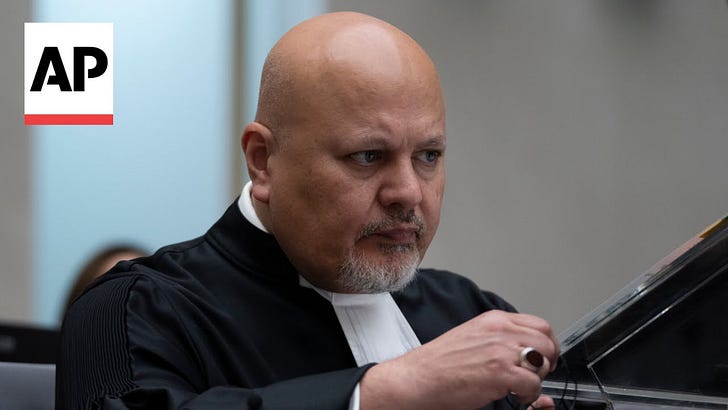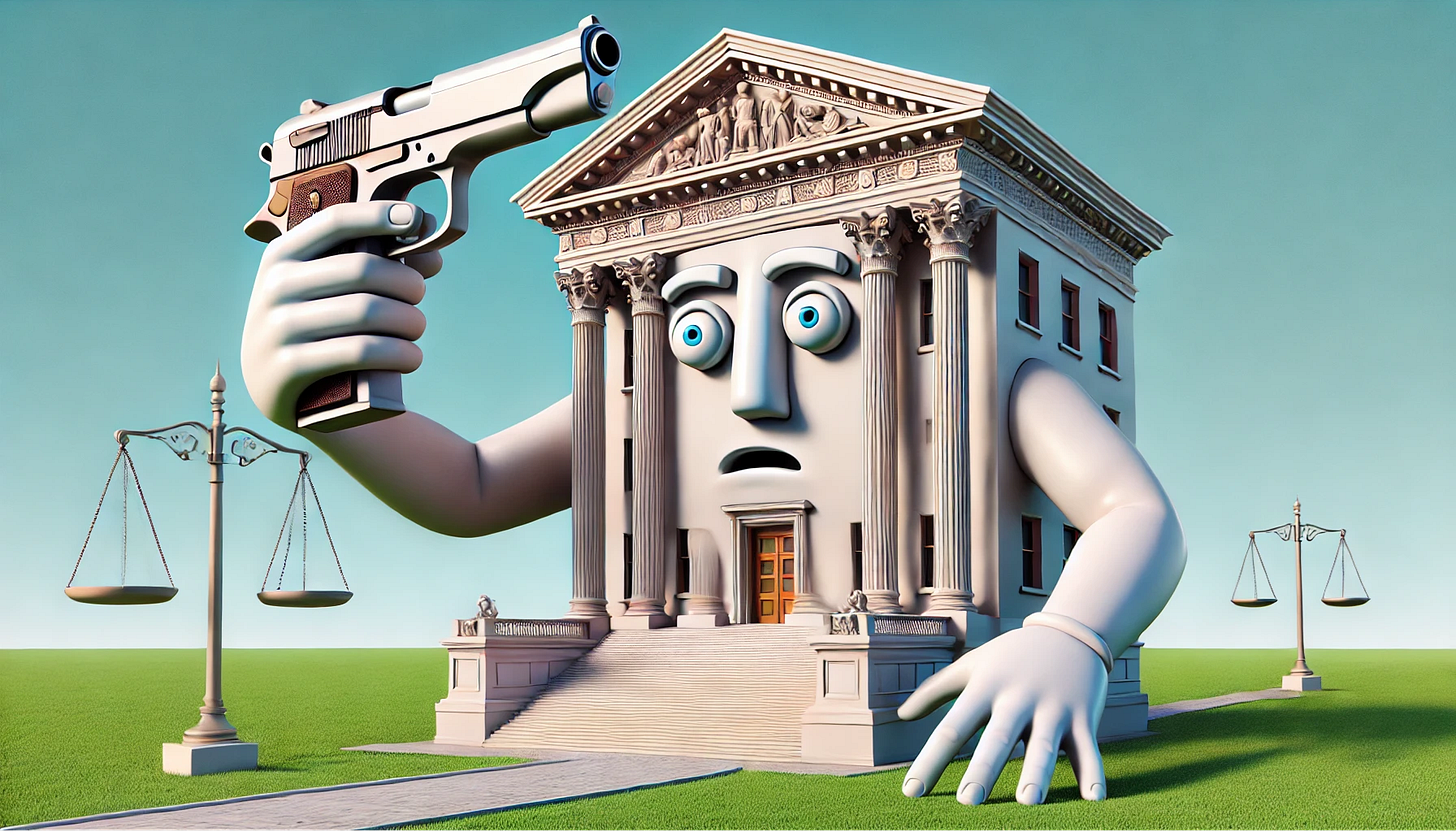BREAKING: ICC Chief Prosecutor Sanctioned by US
CHRIS STEPHEN REPORTS: Move against International Criminal Court comes after Trump complained about its warrants against Israeli leaders
By Chris Stephen
The US Treasury has sanctioned the troubled chief prosecutor of the International Criminal Court, Karim Khan, in the first move against the court by the Trump administration (and as foreseen on these pages two months ago). Khan is now banned from the United States, and any assets and bank accounts he owns there will be frozen, after Trump complained about the court’s warrants against Israeli Prime Minister Benjamin Netanyahu and former defense minister Yoav Gallant.
The blow for Khan — you can read the full Feb. 13 order here — comes as he awaits the verdict of a UN investigation into allegations he committed sexual harassment against one of his employees at the court that could see him dismissed. Khan, a noted British barrister, has denied the allegations.
The Treasury’s announcement was expected, after Trump last month signed an executive order permitting sanctions against the court for its decision to pursue the Israeli indictments.
This ban also applies to Khan’s Malaysian wife, Shyamala Alagendra, a noted human rights lawyer in her own right, who has worked in several international courts, and their two sons.
Court officials may feel they got off lightly, as the president’s executive order allows a much wider sweep not just of the 900 ICC staff, but the circle of organizations and lawyers assisting in the Gaza investigation, together with their spouses and children.
There had been speculation sanctions could include British lawyer Amal Clooney, wife of actor George Clooney, as she is on the panel of experts Khan assembled to assess his Gaza indictments.
Instead, it appears the Trump Administration has chosen to focus for now at least only on the chief prosecutor.
Earlier this month, ICC president Tomoko Akane objected to the Trump sanctions, saying it would harm the Court’s independence.
Court officials have protested against American and Israeli complaints that it has no jurisdiction over Netanyahu, on the basis that it has recognized Palestine as an ICC member state, giving the court the power to investigate all forces operating in its territory (which includes Gaza).
But there is also anger among Republicans on Capitol Hill at the one-sided nature of the ICC charges. Three Hamas leaders were charged along with Netanyahu and Gallant in November, but all are now confirmed dead. The ICC has chosen not to indict living Hamas leaders, such as those supervising the holding of Israeli hostages in Gaza.
The sanctions are unlikely to have an immediate effect on Khan, as he has no need to travel or operate in the United States for his ICC work, and has no ties to the country.
Before becoming chief prosecutor, he built a career as a top war crimes defense lawyer, with clients including Libya’s Saif Gaddafi, son of the slain former dictator Muammar, and Kenya’s then-deputy president, William Ruto.
Meanwhile, heftier sanctions are in the pipeline from the US Congress. The House of Representatives and Senate are both fashioning bills to further sanction ICC personnel and also withhold military aid from any ICC member state not giving Israelis immunity from arrest. Several NATO members, including France, Italy, Hungary and Greece have already granted Israel that immunity.
The fear in The Hague is that Congressional sanctions will forbid US banks from clearing ICC payments and compel Microsoft to cease operating the court’s IT systems. As a precaution, Reuters reported last month that the court had paid its staff three months in advance.
Through the expert reportage of Chris Stephen, Ask Questions Later has been consistently ahead on the controversies surrounding the ICC. For more reading, consider these stories:
The Italian Job: How to Dodge Justice and Fly Home in Style (Jan. 23)
The International Criminal Court has suffered a new blow to its authority after Italy released a key Libyan suspect in defiance of the court’s wishes. Libyan police general Osama Njeem was accused by the ICC of murder, torture and sexual violence as alleged boss of a detention center in the capital Tripoli. His arrest and release have been dramatic, verging on bizarre.
The ICC’s Israel Arrest Warrants have Backfired (Dec. 19)
The International Criminal Court’s decision to issue arrest warrants against Israeli leaders appears to have badly backfired. The court is now confronting a growing list of member countries weighing grants of immunity to the Israeli officials and the threat of punishment from the incoming U.S. presidential administration of Donald Trump. At a Dec. 2 meeting of the court’s 124 member nations, the atmosphere was one of emergency. There was a clear sense that the indictments of Israeli Prime Minister Benjamin Netanyahu and former Defense Minister Yoav Gallant, for their actions in the war against Hamas in Gaza, have exposed such glaring vulnerabilities that the institution is itself in danger.
Netanyahu Arrest Warrant Puts International Court on Collision Course with Trump (Nov. 21)
After months of delay, the International Criminal Court in The Hague today indicted Israeli Prime Minister Benjamin Netanyahu for war crimes and crimes against humanity. Netanyahu becomes the first leader of a Western democracy indicted for war crimes, one reason why the case has such a massive profile. It also sets the court on a collision course with America’s incoming Trump administration, which is almost certain to pass legislation sanctioning the ICC and possibly countries that support it. New Senate Majority Leader John Thune has slammed the allegations against Netanyahu as “outrageous and unlawful” and said sanctions legislation against the ICC will be “a top priority.”
Gaza May Tear the ICC Apart (Oct. 28)
The International Criminal Court’s Gaza case, announced amid great fanfare in May (see above video) is in trouble. Even before Friday’s allegations of sexual harassment, which may cost chief prosecutor Karim Khan his job, it was stretching things like no other case in the court’s 22-year history. The world’s most contentious war has produced the court’s most contentious war crimes investigation. The problems started the day Palestine joined the court. The ICC is not part of the United Nations, operating instead as a “treaty organization” (or, in simple terms, a club). The 125 nations who are members make the rules, and submit to ICC justice. Several key nations are not members – notably the United States, China and Russia. And that’s where it gets messy, because non-members are not subject to ICC law, unless their forces are operating in member territory. Which is where Israel comes in.
Chris Stephen is author of The Future of War Crimes Justice, published in February 2024 by Melville House (London and New York) and Judgement Day: The Trial of Slobodan Milosevic (Atlantic Books, New York, 2005). He has reported on nine wars for many publications and has written about war crimes justice for The Guardian, International Institute for Strategic Studies, Petroleum Economist, and Counsel, the magazine of the Bar of England and Wales.



